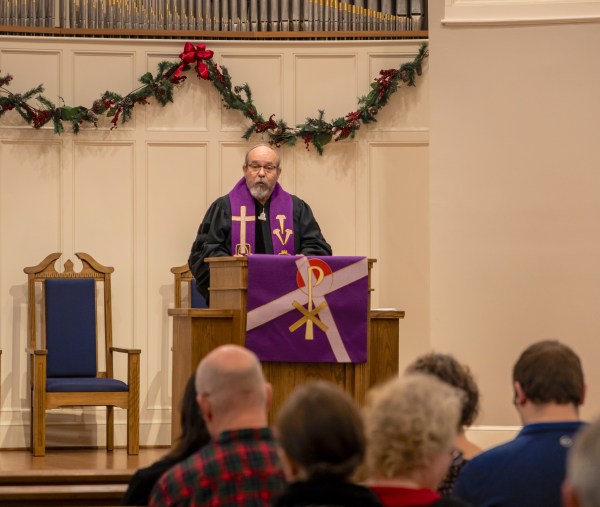
Gaining perspective: looking back, around, and ahead with R.J. Gore

Professor of Systematic Theology Dr. R.J. Gore joined the Erskine Theological Seminary faculty in 1996 and worked as both a professor and an administrator. He retired from his administrative role and was named Dean of the Seminary Emeritus in 2021. Gore is a retired U.S. Army Chaplain (Colonel) whose 29 years of active and reserve service included work as a Group Chaplain, 172d Corps Support Group in Balad, Iraq, from December 2003 to December 2004. Here, he talks about some elements of his own history as well as a few of today’s challenges. He also provides a preview of his upcoming Alumni Weekend “Back to Class” session for seminary alumni scheduled for Saturday, March 25, at 1:30 p.m. in the Patrick Room of Bowie Divinity Hall.
When your retirement from your administrative position was announced in 2021, it was also announced that you would be continuing as Professor of Systematic Theology and Ministry. The word “Ministry” is no longer a part of your title. What is your day-to-day work like now?
A few years back our Ministry Department had thinned out due to faculty retirement. I had completed a Doctor of Ministry (D.Min.) in preaching a number of years ago and was active teaching a few ministry courses each year. My title was changed to reflect this addition to my teaching responsibilities and to strengthen the Ministry Department. With the addition of Dr. Florica Saracut, Dr. Seth Nelson, and Dr. Matthew Miller, I am no longer needed in that department. Currently, about two-thirds of my teaching is in the Theology Department. In addition to teaching, I am currently the Director of the Master of Arts in Theological Studies degree and the Master of Arts in Practical Ministry. I routinely supervise a half-dozen or so D.Min. students and their dissertations.
What are some of the courses you are teaching since stepping away from your role as dean?
Every year I teach the three courses in our Systematic Theology sequence (ST601, ST602, ST603) as well as the Christian Ethics course (ET711). I also teach the foundational D.Min. course, DR901, Theological Foundations for Ministry, usually in January and July. In addition to these required courses, I occasionally teach WP551, Christian Worship; ST715, The Westminster Standards; and ST780, Apologetics and World Religions. At the doctoral level I teach DN983, The Problem of Pain; DN956, Theology of Worship in Contemporary Discussion; and DF922, Renewing Your Preaching.
Do you record lectures for use in Erskine Seminary’s online classes? How does that differ from simply coming into a classroom and speaking to students?
The three Systematic Theology courses, the Christian Ethics and Christian Worship courses, and the D.Min. course, Theological Foundations for Ministry, have all been recorded. In their online formats, these video-based courses are supplemented by synchronous online meetings for live discussion. The videos take the place of live lectures, so the synchronous meetings allow an opportunity for more in-depth discussion of issues raised in the lectures.
What are some of the significant challenges you see seminaries facing over the next decade or so?
The big challenge is how to use the online format wisely. The days of residential theological education are, by and large, in the past. Now, given the online model, the question is how to promote community and spiritual formation in that format. There is also the need to integrate pastors and churches into our extended family so our students have a place to do ministry and gain real experience under the tutelage of experienced pastors.
You have served as a military chaplain yourself and have seen the heyday of chaplain education at Erskine Seminary. From your perspective today, how important are military chaplains and why? Do you see some ways in which this ministry is changing?
Military chaplains are essential to the spiritual care of soldiers, sailors, airmen, and Marines. In the continental U.S., chapels and chaplains are not the only show in town. Most military personnel are able to get off-post if they want to go to church. But when those men and women are deployed overseas, chaplains are the only show in town! Chaplains are the key resource for worship services and counseling. Chaplains have always worked in a pluralistic environment, but today’s military is more wildly pluralistic than ever. The military is a microcosm of our increasingly diverse society. The greatest challenge for chaplains is to find that path that enables them to remain faithful to their church and their beliefs, while developing a gentle and winsome spirit that welcomes those whose belief system is radically “other.”
Will you please describe your Back to Class session during Alumni Weekend—topic, format, approach? Why should seminary alumni make a beeline for the Back to Class session?
I plan to talk about “My Journey to the Center.” I have had a fascinating career, having studied at Fundamentalist schools, Conservative Presbyterian schools, liberal Presbyterian seminaries, and an Archdiocesan Seminary in the Roman Catholic Church. Over my 67 years, I have been an attendee at the Pentecostal “Bible Revival Center,” a member of the Free Will Baptist Church, a Youth Pastor in an Independent Baptist Church, and member of three Presbyterian denominations. I have been a pastor, a chaplain, a seminary professor, and a seminary dean. I have clumsily sought that middle ground where Christ is the Center of my life, my beliefs, and my ministry. Now, in my senior years, I am convinced that what is most important is not what separates us, but what unites us. My plan is to share some of my journey in hopes I can help others find some shortcuts to the Center.
